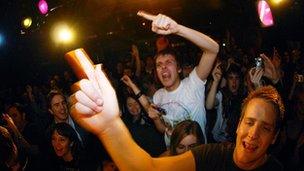Live music red tape lifted for small venues
- Published

The bill affects venues with a capacity of fewer than 200 people
Venues in England and Wales with a capacity of under 200 people will no longer need a licence for live music.
The change in law is part of a government move to free businesses from red tape, which ministers say will give them more freedom to grow.
UK Music, which represents the music industry, estimates that the Live Music Act could enable 13,000 more venues to start holding live music events.
Live unamplified music can also now be played in any location under the act.
Musicians and business owners have welcomed the change, which will allow live music to be played between the hours of 08:00 and 23:00 but it has not proved popular with noise campaigners.
Jazz musician Buster Birch described the change as "a huge thing", adding that live music is "very important for our society and our culture".
However Lisa Lavia from the Noise Abatement Society said there will be a "dramatic rise" in noise complaints that will "set residents at odds with local businesses".
Business Minister Michael Fallon said: "From today businesses are freed from the red tape that holds them back.
He described the previous rules that affected pub gigs and small live performances as "over-the-top bureaucracy that stifles community groups and pubs".
UK Music: We love noise
"We've set ourselves the challenging target of scrapping or reducing a total of 3,000 regulations. I'm determined to slim down regulation and make Britain an easier place to start and run a business," Mr Fallon added.
The change was introduced through a private member's bill, introduced by Liberal Democrat Don Foster, in order to amend some of the bureaucracy imposed on gigs by the 2003 Licensing Act.
The MP from Bath steered the bill through the House Of Commons on behalf of his Lib Dem colleague, Lord Clement Jones. The success is a relatively rare example of a House of Lords private member's bill making it into law.
However, the government has made it clear there would be no changes on the rules controlling gatherings of more than 5,000 people, boxing and wrestling, and events such as lap-dancing clubs classed as sexual entertainment.
- Published20 January 2012
- Published1 December 2011
- Published1 December 2011
- Published10 September 2011